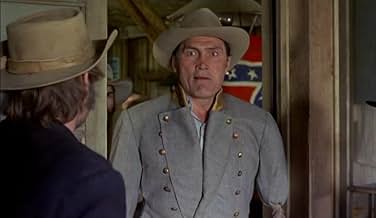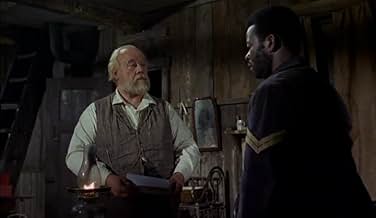Agrega una trama en tu idiomaWhen a black Civil War veteran becomes co-owner of the southern McMasters ranch, the incensed local Confederate veterans come gunning for him and his Indian wife.When a black Civil War veteran becomes co-owner of the southern McMasters ranch, the incensed local Confederate veterans come gunning for him and his Indian wife.When a black Civil War veteran becomes co-owner of the southern McMasters ranch, the incensed local Confederate veterans come gunning for him and his Indian wife.
- Dirección
- Guionista
- Elenco
Marion Brasch
- Mrs. Watson
- (as Marion Brash)
David Strong
- Otis
- (as Rev. David Strong)
- Dirección
- Guionista
- Todo el elenco y el equipo
- Producción, taquilla y más en IMDbPro
Opiniones destacadas
What an eclectic cast: Brock Peters, Burl Ives, Nancy Kwan, Jack Palance, and John and David Carradine. I had to check out The McMasters after seeing credits like that. An interesting premise sees Brock returning home after the Civil War, and while the white residents were friendly to him before he left, they're very hostile now that the South has lost. Burl Ives is nice to him, as the man who raised him, and he signs over half his land to make them equal partners - which really makes the neighbors mad.
While we never really understand why Brock sticks around, or why Burl isn't killed for his "treachery", or why Nancy Kwan is never going to show up, she finally does after thirty minutes. I can't believe she took this part, and frankly, I can't believe Brock Peters did, either. "Uglied up" to play a reservation Indian with broken English, Nancy gets given to Brock as a present. After being told that she'll do anything he wants, he chases her around the desert, rapes her, then runs away - why would either of them read the script and sign on for this movie? After making an indelible impression by stating so tearfully that he did not rape a woman in To Kill a Mockingbird, why would he ever agree to a movie where he does? And why would Nancy sign on after reading the script calls for full nudity and two rape scenes?
I can only suppose that nobody read the script. If I'd known how lousy the movie would have turned out, I never would have sat through it. Save yourself ninety minutes and skip it.
Kiddy warning: Due to racial language and a rape scene, I wouldn't let my kids watch this movie.
While we never really understand why Brock sticks around, or why Burl isn't killed for his "treachery", or why Nancy Kwan is never going to show up, she finally does after thirty minutes. I can't believe she took this part, and frankly, I can't believe Brock Peters did, either. "Uglied up" to play a reservation Indian with broken English, Nancy gets given to Brock as a present. After being told that she'll do anything he wants, he chases her around the desert, rapes her, then runs away - why would either of them read the script and sign on for this movie? After making an indelible impression by stating so tearfully that he did not rape a woman in To Kill a Mockingbird, why would he ever agree to a movie where he does? And why would Nancy sign on after reading the script calls for full nudity and two rape scenes?
I can only suppose that nobody read the script. If I'd known how lousy the movie would have turned out, I never would have sat through it. Save yourself ninety minutes and skip it.
Kiddy warning: Due to racial language and a rape scene, I wouldn't let my kids watch this movie.
It seems that there were two ending versions for this movie. I was unlucky because I saw the smooth version, not the harsh one, as I expected to, especially for this period, early seventies, not for the squeamish. This western is gritty and brutal, I agree, and Jack Palance provides a performance close to the one he had in Mike Winner's CHATO'SLAND; a former Civil War officer who, once back home after the war, lead a posse against the hero. Brock Peters pulls here one of his best performances ever, so Burl Ives.
The McMasters is a serious western that does deal with serious issues that may not be appropriate for kids. Set after the Civil War, an African American named Benji is shunned by the townsfolk of Ironside for not only the color of his skin, but because he was part of the Union Army. However, one man, Neal McMasters (played by the legendary Burl Ives), a rancher, is the only man who gives him respect, even to the point where he makes Benji his partner and offers him 50% of the ranch. However, after Benji helps a starving tribe of Indians, which leads to one of the females becoming his wife, it would spark violence by the hands of Colby, an ex-Confederate soldier.
This is a western that is not for kids or those who are easily offended by scenes of prejudice, as the film tackles this subject. Burl Ives does a good job in his role of Neil McMasters, and story is good. This is one I recommend checking out, but only when the kids are in bed.
This is a western that is not for kids or those who are easily offended by scenes of prejudice, as the film tackles this subject. Burl Ives does a good job in his role of Neil McMasters, and story is good. This is one I recommend checking out, but only when the kids are in bed.
'The McMasters' is yet another film that stands as a testament to the changing values of North American society: another case of "There's no way that could have been made today".
Brock Peters plays Benji, a former slave and Civil War veteran who is adopted by kindly-old-white-man Burl Ives ('Mcmasters'), and given title to the old man's farm. Conflict with the racist locals, led by the chilling Jack Palance as Kolby, ensues, leading to a violent conclusion.
To me the film was almost painfully riveting, and frank in its depictions of violence and racism.The violence in today's action films is highly stylized, and almost glamorous by comparison: today's post-Star-Wars escapist fare has no place for the smallest depiction or frank discussion of racism. I found myself getting involved with the characters, cheering them on and yelling advice to the screen. I also loved the western/blacksploitation angle of the film, even though the "showdown" plot is pretty standard western fare.
The film seems old-fashioned when viewed today: does that mean that society has progressed, or regressed since 1969? You be the judge.
Brock Peters plays Benji, a former slave and Civil War veteran who is adopted by kindly-old-white-man Burl Ives ('Mcmasters'), and given title to the old man's farm. Conflict with the racist locals, led by the chilling Jack Palance as Kolby, ensues, leading to a violent conclusion.
To me the film was almost painfully riveting, and frank in its depictions of violence and racism.The violence in today's action films is highly stylized, and almost glamorous by comparison: today's post-Star-Wars escapist fare has no place for the smallest depiction or frank discussion of racism. I found myself getting involved with the characters, cheering them on and yelling advice to the screen. I also loved the western/blacksploitation angle of the film, even though the "showdown" plot is pretty standard western fare.
The film seems old-fashioned when viewed today: does that mean that society has progressed, or regressed since 1969? You be the judge.
"Benjie" (Brock Peters) is a young black man living in the South who stole a horse in order to join the Union forces during the Civil War. After the war he returns to his hometown and is greeted with hatred and animosity by almost everybody. Fortunately, the man who raised him since he was a child "Mr. McMasters" (Burl Ives) has always had a great fondness for him and welcomes him back whole-heartedly. Not only does he give him half ownership of his ranch but he is especially pleased when Benjie decides to take his last name as well. Not long afterward Benjie helps some starving Indians and in appreciation is given a woman by the name of "Robin" (Nancy Kwan). At first he is repelled by the idea and treats her quite cruelly but eventually he comes to love her and make her his wife. But things don't go smoothly after this. Anyway, rather than detail the entire movie and risk spoiling it for those who haven't seen it I will just say that this was an interesting movie that captured the harsh and brutal conditions faced by non-whites who tried to rise above their surroundings during this particular time in the United States. Additionally, while I liked the performance of Nancy Kwan and David Carradine (as "White Feather") I thought both of them were slightly miscast in their respective roles. Be that as it may, while I consider this movie to be slightly above average I should also warn parents that this is not a movie that one would want to watch with smaller children due to the rather graphic content depicted.
¿Sabías que…?
- ErroresIn an early scene, Watson is shown butchering an animal and has blood on his white apron. A few minutes later when leaving his store the apron is completely white.
- Versiones alternativasOriginally released in 2 versions with differing amounts of violence and different endings.
Selecciones populares
Inicia sesión para calificar y agrega a la lista de videos para obtener recomendaciones personalizadas
- How long is The McMasters?Con tecnología de Alexa
Detalles
Taquilla
- Presupuesto
- USD 2,000,000 (estimado)
- Tiempo de ejecución1 hora 30 minutos
- Relación de aspecto
- 4:3
Contribuir a esta página
Sugiere una edición o agrega el contenido que falta

Principales brechas de datos
By what name was The McMasters (1970) officially released in India in English?
Responda





























